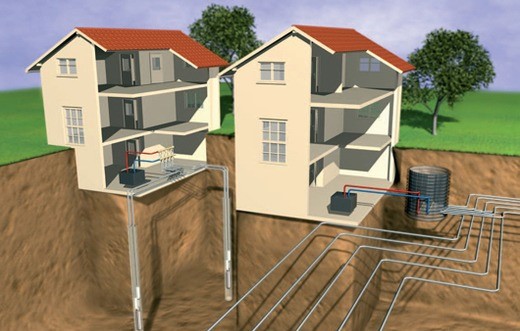Geothermal heat pumps ( Ground-Source Heat Pump or GSHP ) use solar energy and the heat stored in the earth and are an efficient way to heat water in your home.
Learn the main advantages and disadvantages of geothermal heat pumps and find out if this technology really is the right choice for your investment.
They therefore need a source of heat (the outside air), two heat exchangers (one used to absorb heat and the other to release it) and a small amount of motive power to keep the system running.
Geothermal heat pumps were initially developed for residential use but later extended to the commercial area given its advantages.
Even in colder climates, geothermal heat is well present in the soil, translating into a constant temperature of 10 degrees celsius to a depth of more than 15 meters.
The efficiency of heat pumps is dependent on the temperatures between which energy is exchanged in the form of heat.
Learn how geothermal heat pumps work .
Geothermal heat pumps take advantage of geothermal properties and are more efficient than conventional heat pumps. They consume less energy, provide great comfort, save on expenses and help reduce gas emissions.

If you are curious to know more about geothermal heat pumps, we will present you with all the advantages and disadvantages of geothermal heat pumps.
Table of Contents
Advantages of geothermal heat pumps
- The geothermal energy is available, renewable and endless;
- Low noise level;
- No emissions;
- Very long service life (for interior components is 20 years and buried for up to 50 years);
- Heat pumps consume much less energy than conventional systems and their implementation in buildings such as hospitals allows very high savings;
- They guarantee the same level of comfort;
- They do not depend on the outside temperature but on the subsoil temperature;
- The stability of the soil temperature is a very important advantage (since there are no large oscillations throughout the year) and translates into good performance even when the outside temperature is very cold;
- High energy efficiency – for example, to heat the same amount of water from a pool with a heat pump it spends only 20% of what is spent on electrical resistances. Geothermal heat pumps have a superior efficiency, up to 50% more (due to temperature stability).
Disadvantages of geothermal heat pumps
- The initial investment is high since it implies the equipment and the excavation. However, if there is a good proportion, the costs are quickly outweighed by the energy savings they allow;
- Not suitable on rocky soils;
- For horizontal heat exchangers, the surface where they are installed must be free
